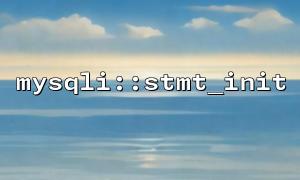In PHP, mysqli::stmt_init is a way to create prepared statements, which can help developers prevent SQL injection and improve the security of database operations. However, many developers often overlook common error checks when using mysqli::stmt_init, which can lead to potential vulnerabilities or issues during runtime. This article will explore some of the common places where error checks are ignored when using the mysqli::stmt_init function.
Before using mysqli::stmt_init to create a prepared statement, it is crucial to ensure that the database connection is successful. Ignoring the database connection error check may lead to mysqli::stmt_init returning false, and developers may not realize the issue.
Incorrect Example:
$conn = new mysqli("localhost", "user", "password", "database");
$stmt = $conn->stmt_init(); // Failing to check if $conn is a valid database connection
Correct Example:
$conn = new mysqli("localhost", "user", "password", "database");
if ($conn->connect_error) {
die("Connection failed: " . $conn->connect_error);
}
$stmt = $conn->stmt_init();
mysqli::stmt_init returns a new statement object, or false in case of failure. However, many developers fail to check the return value of stmt_init and proceed to use it, leading to errors when the statement initialization fails.
Incorrect Example:
$stmt = $conn->stmt_init();
$stmt->prepare("SELECT * FROM users WHERE id = ?");
Correct Example:
$stmt = $conn->stmt_init();
if ($stmt === false) {
die("Statement initialization failed");
}
$stmt->prepare("SELECT * FROM users WHERE id = ?");
Even if mysqli::stmt_init successfully initializes the statement object, the SQL syntax error in the prepare method should not be ignored. If the SQL statement is incorrect, prepare will return false, but many developers fail to check for this error.
Incorrect Example:
$stmt = $conn->stmt_init();
$stmt->prepare("SELECT * FROM users WHERE id = ?");
$stmt->execute();
Correct Example:
$stmt = $conn->stmt_init();
if ($stmt === false) {
die("Statement initialization failed");
}
if (!$stmt->prepare("SELECT * FROM users WHERE id = ?")) {
die("SQL syntax error: " . $stmt->error);
}
$stmt->execute();
When using bind_param to bind query parameters, developers may overlook errors in the binding process. If parameter binding fails, the error should be caught and handled promptly.
Incorrect Example:
$stmt = $conn->stmt_init();
$stmt->prepare("SELECT * FROM users WHERE id = ?");
$stmt->bind_param("i", $userId);
$stmt->execute();
Correct Example:
$stmt = $conn->stmt_init();
if ($stmt === false) {
die("Statement initialization failed");
}
if (!$stmt->prepare("SELECT * FROM users WHERE id = ?")) {
die("SQL syntax error: " . $stmt->error);
}
if (!$stmt->bind_param("i", $userId)) {
die("Parameter binding failed");
}
$stmt->execute();
When executing a prepared statement, the return value of the execute method should be checked. A return value of true indicates success, while false indicates failure. Many developers neglect this check, leading to the lack of timely feedback when a query fails.
Incorrect Example:
$stmt = $conn->stmt_init();
$stmt->prepare("SELECT * FROM users WHERE id = ?");
$stmt->bind_param("i", $userId);
$stmt->execute(); // Failing to check the return value
Correct Example:
$stmt = $conn->stmt_init();
if ($stmt === false) {
die("Statement initialization failed");
}
if (!$stmt->prepare("SELECT * FROM users WHERE id = ?")) {
die("SQL syntax error: " . $stmt->error);
}
if (!$stmt->bind_param("i", $userId)) {
die("Parameter binding failed");
}
if (!$stmt->execute()) {
die("Query execution failed: " . $stmt->error);
}
Although PHP automatically closes database connections at the end of a script, in long-running applications, it is recommended to manually close statements and connections. Failing to close connections can lead to memory leaks or database resource wastage.
Incorrect Example:
$stmt = $conn->stmt_init();
$stmt->prepare("SELECT * FROM users WHERE id = ?");
$stmt->bind_param("i", $userId);
$stmt->execute();
Correct Example:
$stmt = $conn->stmt_init();
if ($stmt === false) {
die("Statement initialization failed");
}
if (!$stmt->prepare("SELECT * FROM users WHERE id = ?")) {
die("SQL syntax error: " . $stmt->error);
}
if (!$stmt->bind_param("i", $userId)) {
die("Parameter binding failed");
}
if (!$stmt->execute()) {
die("Query execution failed: " . $stmt->error);
}
$stmt->close();
$conn->close();
By performing proper error checks and exception handling, potential issues when using mysqli::stmt_init can be effectively avoided. Always remember to check return values after each operation to ensure the robustness and security of the code. It is hoped that this article will help developers improve the reliability of database operations and avoid common errors and omissions.
Related Tags:
mysqli














